Do you want to get word count stats in WordPress?
When writing a post, you may have a specific word count that you’re aiming to reach. Plus, monitoring your word count stats can give you insights like what post length gets the most traffic and engagement.
In this article, we will show you how you can show detailed word count stats in WordPress.
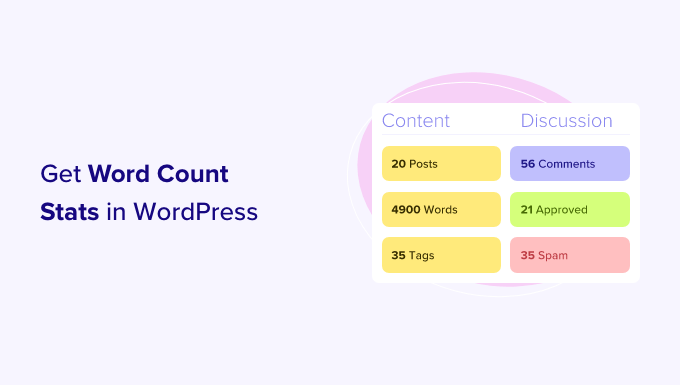
Why Get Word Count Stats for Your WordPress Website?
There are many reasons why you may want to get the word count for your WordPress website.
If you’re a freelance writer, then you may charge per word or your clients might have strict word count goals that you need to meet.
If you’ve added multiple authors to your WordPress blog, then monitoring their word count stats can help you identify the authors who are contributing the most to your website.
This insight can help you manage your multi-author WordPress blog more efficiently. For example, you might reward the author who has the highest word count, or schedule meetings with any writers who are underperforming.
Even if you’re the only person working on a website, word count stats can still be interesting. By looking at how your word count changes over time, you may be able to spot patterns and ways to be more productive.
With all that in mind, let’s look at a few different ways to get word count stats in WordPress. If you prefer to jump straight to a particular method, then you can use the links below.
- Method 1. How to check the word count on an article in WordPress
- Method 2. Get more detailed word count stats with a plugin
- Method 3. How to add word count stats in WordPress using code
Video Tutorial
If you’d prefer written instructions, just keep reading.
Method 1. How to Check the Word Count on an Article in WordPress
The WordPress block editor makes it easy to see the word count for any page or post.
Simply click on the ‘i’ icon at the top of the screen, and WordPress will show some basic stats for the page or post, including the word count.
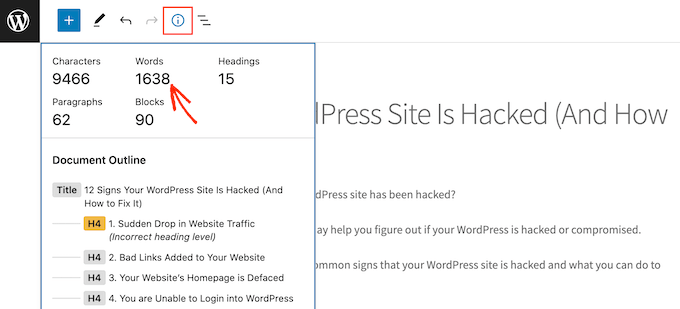
Even better, this word count will update automatically as you write.
If you have a word limit, then this is a quick and easy way to make sure you don’t go over that limit.
Method 2. Get Detailed Word Count Stats in WordPress With a Plugin
Sometimes you may want to see word count stats for a particular author, type of post, or even your entire website.
The easiest way to get these detailed stats is by using the WP Word Count plugin. This plugin shows how many words you’ve written based on month, author, and post type.
If you’re using custom post types, then WP Word Count can also show statistics for your custom posts.
First, you’ll need to install and activate the plugin. If you need help, then please see our guide on how to install a WordPress plugin.
Once you’ve done that, go to Word Count » Statistics. Before you can get your stats, you’ll need to click on the ‘calculate’ link.
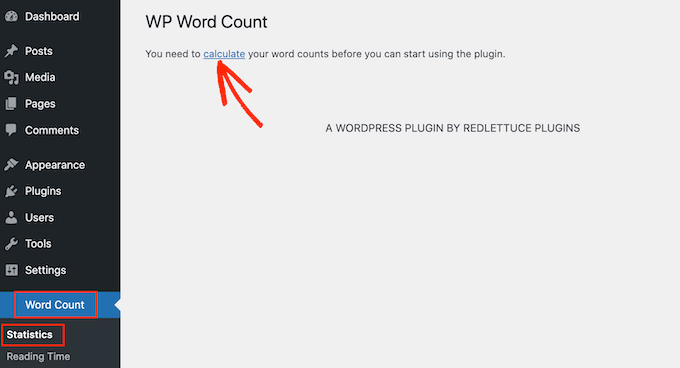
WP Word Count will ask whether you want to count the words for all your content, or to only count content that was created within a certain date range.
To calculate the total word count for your entire site, click on the ‘Count all content on this site at one time’ option. Then, go ahead and click on Calculate Word Counts.
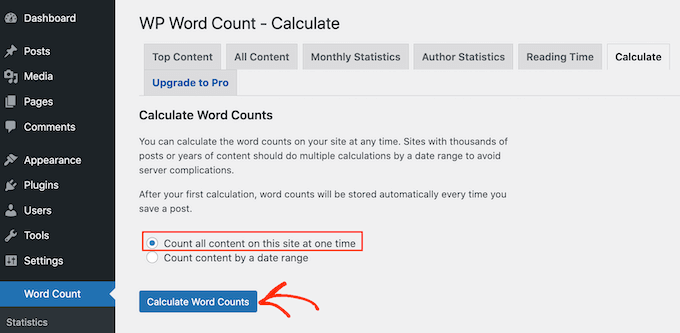
After a few moments, you should see a ‘Word counts calculated successfully’ message.
WP Word Count will now continue to calculate your stats automatically as you add more posts and pages to your site. This means you won’t need to click on the ‘calculate’ link every time you want to see the latest word count stats.
Now, anytime you want to see your stats, you can go to Word Count » Statistics. To see the total word count for all your content, click on the All Content tab.
On this screen, you’ll see the total word count for the different post types, divided into published and unpublished content.
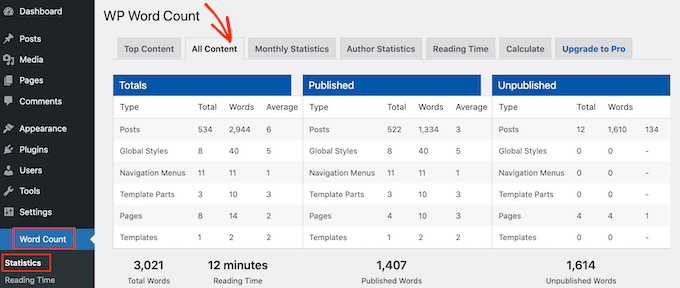
‘Total Words’ is your total word count across all content types.
This number combines both your published and unpublished content, so it isn’t necessarily the amount of words that visitors will see live on your website.

This screen also shows separate word counts for published and unpublished content.
If you want to see the word count for specific months, then simply click on the ‘Monthly Statistics’ tab. This can help you spot trends including your most productive months, and times when you wrote fewer words compared to other months.
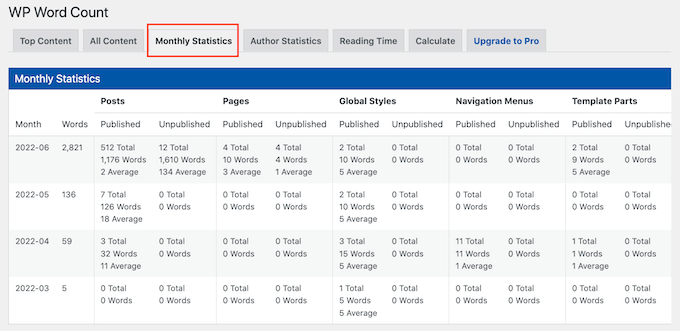
If multiple people write for your WordPress blog, then you may want to take a look at the ‘Author Statistics’ tab.
This lets you explore your site’s word count stats by author.
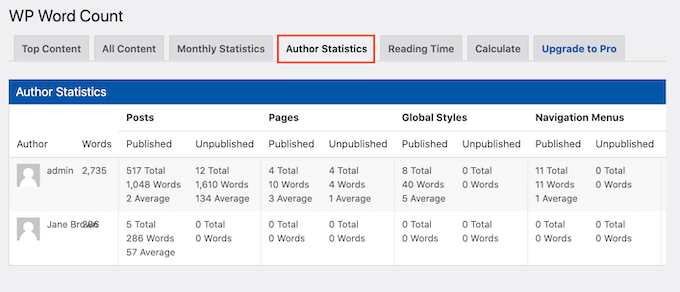
You might also want to track the traffic that each of your authors brings to your website. To do that, you can see our guide on how to set up author tracking in WordPress.
By monitoring these important metrics on your WordPress site, you can identify what’s working on your website and what isn’t.
You can then use this insight to fine-tune your content calendar to get even more visitors to your website, and make money online blogging with WordPress.
Method 3. How to Add Word Count Stats in WordPress Using Code
Another option for tracking word counts is a code solution. This code snippet will show the word count next to each post on the Posts » All Posts screen.
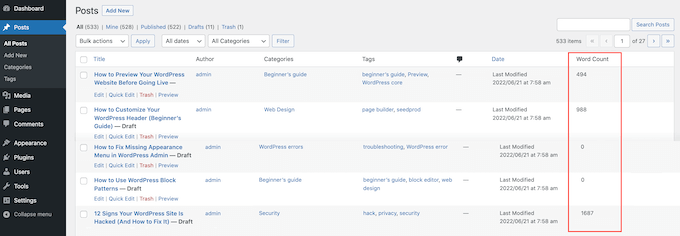
This is an easy way to spot your site’s longest posts, or check for any posts that don’t meet a required word count.
To show a word count on the All Posts screen, you’ll need to add some code to your site. We recommend doing this by creating a site-specific plugin or using a code snippets plugin.
No matter what option you choose, you’ll need to add the following code:
add_filter('manage_posts_columns', 'wpbeginner_add_column');
function wpbeginner_add_column($wpbeginner_wordcount_column) {
$wpbeginner_wordcount_column['wpbeginner_wordcount'] = 'Word Count';
return $wpbeginner_wordcount_column;
}
//Link the word count to our new column//
add_action('manage_posts_custom_column', 'wpbeginner_display_wordcount');
function wpbeginner_display_wordcount($name)
{
global $post;
switch ($name)
{
case 'wpbeginner_wordcount':
//Get the post ID and pass it into the get_wordcount function//
$wpbeginner_wordcount = wpbeginner_get_wordcount($post->ID);
echo $wpbeginner_wordcount;
}
}
function wpbeginner_get_wordcount($post_id) {
//Get the post, remove any unnecessary tags and then perform the word count//
$wpbeginner_wordcount = str_word_count( strip_tags( strip_shortcodes(get_post_field( 'post_content', $post_id )) ) );
return $wpbeginner_wordcount;
}
You can then save your changes.
Now, if you visit the Posts » All Posts screen, you’ll see the word count in a new column.
We hope this guide helped you learn how to get word count stats in WordPress. You may also want to learn how to set up Google Analytics goals for your WordPress site, or check out our list of the best email marketing services for small businesses.
If you liked this article, then please subscribe to our YouTube Channel for WordPress video tutorials. You can also find us on Twitter and Facebook.





Syed Balkhi says
Hey WPBeginner readers,
Did you know you can win exciting prizes by commenting on WPBeginner?
Every month, our top blog commenters will win HUGE rewards, including premium WordPress plugin licenses and cash prizes.
You can get more details about the contest from here.
Start sharing your thoughts below to stand a chance to win!
Jiří Vaněk says
Thank you for the guide, I’ll try using the snippet because I don’t want to unnecessarily go the route of an external plugin and burden WordPress. Since I sometimes post short updates on the website, I still try to maintain a minimum article length of 300 words. Until now, I used to write articles in LibreOffice first to see the word count. Now I won’t have to
WPBeginner Support says
You’re welcome, in case it was a concern, not all plugins cause a slowdown on your site, we would recommend taking a look at our article below for more on this:
https://www.wpbeginner.com/opinion/how-many-wordpress-plugins-should-you-install-on-your-site/
Admin
Bernardo K. says
Awesome. We are using the code block and it is working very good.
WPBeginner Support says
Glad to hear the code is working!
Admin
WPBeginner Support says
You would want to try checking under the document overview section in the outline tab.
Admin
Dave says
The ‘i’ icon is missing with 6.2 update. Can’t find it anywhere. Any ideas?
Shelley Johnson says
The little ‘i’ icon is gone! How do I get it back?
WPBeginner Support says
You would want to check the top-right under the … and check your preferences. If ‘Reduce the interface’ is enabled then that is the most likely reason why you don’t see it.
Admin
john says
Thanks for the code (method 3). Is there a way to make the column sortable by clicking header?
WPBeginner Support says
Not at the moment but we will look into the possibility for the future.
Admin
Shardha says
How can we count total number of another competitor’s website?? Suppose a website has 30 articles, how can we count total number of words in those 30 articles, since it is other’s website?
WPBeginner Support says
We do not have a recommended method for that at this time.
Admin
Melanie says
i cannot find the widget to count words, help!
WPBeginner Support says
You would want to reach out to the plugin’s support to see if it is an error with the plugin itself.
Admin
Ricard says
Thanks for the post! Great info! But as always I’d like to know more and more :D. Is there any method to know how many words have all the comments (approved) in a post, or in all posts of some category… or even all the posts in your website.
Thanks!!
WPBeginner Support says
We do not have a recommended method for that at the moment.
Admin
Haley Hines says
I’ve integrated user profiles into the sidebar of my site. I’d like to pull how many words that specific user has written into the profile. Is there an easy way to do this since I have this plugin installed?
Christian Karasiewicz says
Now if only this would integrate with Google Analytics to show authors how well their posts were performing.
Amy says
Really informative, thanks.
Gretchen Louise says
The writers at my contributor blog are going to love seeing the stats from this!
Editorial Staff says
Yes, this is a pretty nuts stat when you look at it.
Admin
Jigar Doshi says
I would love to check-out the plugin and check for myself the total number of words I’ve written over-all.
But, I’m not really sure I would like to show it to the whole world.
[P.S : I would only prefer showing the total pageviews to the world :P]
Editorial Staff says
Jigar, you don’t have to show the count to the whole world. You can just use it for your personal use in the admin panel.
Admin